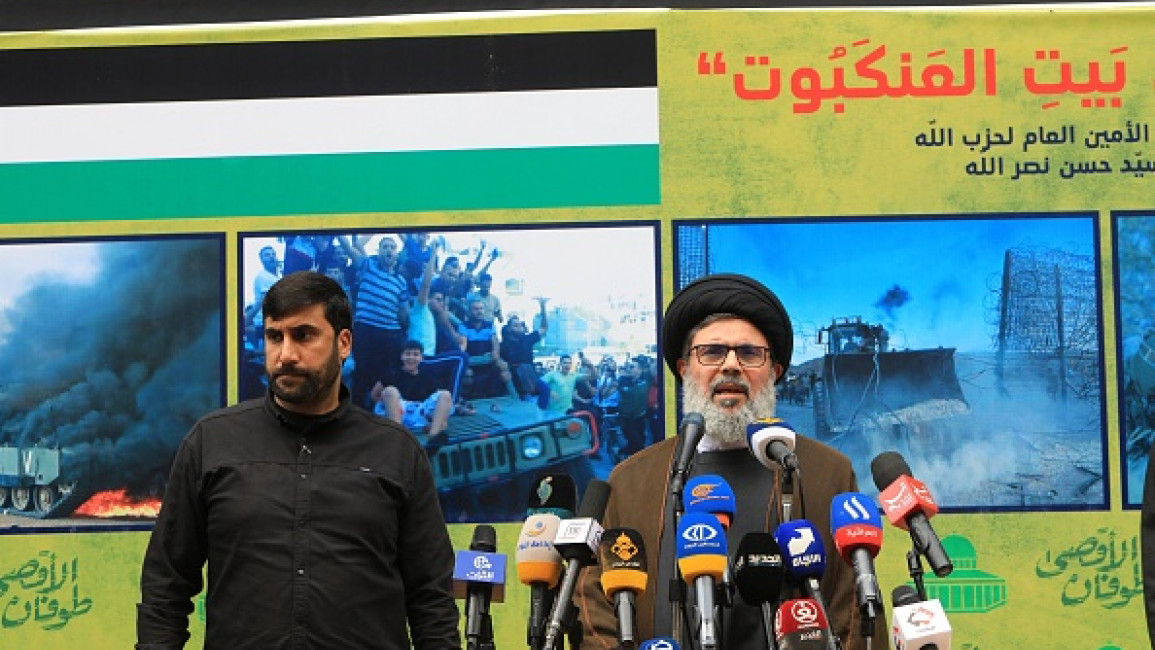Will Hezbollah join Hamas in its fight against Israel?
On Sunday morning, pro-Iran group Hezbollah shot at least two separate rounds of rockets at the Israeli-occupied Shebaa Farms, prompting retaliatory shelling from Israeli forces.
The rocket exchange occurred as Palestinian resistance group Hamas continued operation al-Aqsa Flood in southern Israel – its largest attack in decades.
Hezbollah has given rhetorical support to Hamas and said it is "assessing" the situation in Israel, but has stopped short of fully attacking Israel.
While analysts have suggested that a full escalation by Hezbollah is unlikely, pointing to the fact that rocket fire has been so far limited to occupied Lebanese territory, tensions are high along the border.
Whether Hezbollah opens up a second front against Israel along the Lebanese border depends on a few factors, including Israel's response against Hamas moving forward and the scope of Hezbollah's current goals.
Will Hezbollah join in?
Exchanges of rockets between Israel and armed groups in Lebanon's south have happened sporadically in recent years, with both parties targeting specific areas to ensure that the conflict does not escalate.
However, on Sunday, Hezbollah openly claimed responsibility for the rockets fired at northern Israel – a rarity for the group.
A day prior, Hezbollah organised a press conference in Beirut's southern suburbs, where Hezbollah, Hamas, and Hezbollah-aligned SSNP speakers pledged their support for Palestinian fighters.
"What happened today is unlike any day we have experienced, there will of course be huge ramifications, not just on the geographic and Palestinian level, but rather on the strategic level," Faysal Abdelsater, a political analyst close to Hezbollah, said at the conference yesterday.
He further pledged that the resistance – a term used by Hezbollah, Syria, Iran and Hamas to refer to its alliance – is in "one battle together."
Video showing Hezbollah’s attack on Israeli military post in the occupied Sheba’ farms. As clear this wasn’t a mortar attack but a rocket. pic.twitter.com/lqJkUtktUS
— Ali Hashem علي هاشم (@alihashem_tv) October 8, 2023
Despite the heightened rhetoric, strikes have fallen within the normal rules of engagement that have dictated flare-ups between Israel and Hezbollah.
"We haven't crossed the point of no return. It's still possible given that Hezbollah's public statements have kind of been hedging … that what it has done until now is just symbolic and it doesn't actually want to get involved," David Wood, the Crisis Group's Senior Analyst for Lebanon, told The New Arab.
It is possible that Hezbollah is still waiting to see the severity of Israel's response in Gaza before deciding its next course of action.
"The path forward is going to be determined by exactly how brutal the Israelis are in Gaza," Wood said.
As of the time of publishing, Israeli airstrikes had killed 313 people and wounded 1,700, while the Israeli death toll was over 600.
Unconfirmed reports have also said that Hezbollah has indirectly told Israel that it would take military action if Israel launched a ground invasion of Gaza, rather than just conducting airstrikes.
Hezbollah MP Hussein Jishi told TNA sister site al-Araby al-Jadeed that the situation thus far is a reaction to Israeli occupation of Lebanese territory, and that further developments will be linked to "Israeli performance and folly."
Regional victory with minimal costs for Hezbollah
Hezbollah issued a statement on Saturday congratulating Hamas and the Palestinian people for its "large-scale heroic operation crowned with victory and divine support."
The group also hosted a rally in Beirut on Sunday in solidarity with Palestine, where the mood was jubilant among the hundreds of attendees.
Speakers at the press conference the day prior praised the close coordination between Hamas and Hezbollah in the run-up to Operation al-Aqsa flood.
Though the attack in Israel was carried out by Hamas, analysts have said that its implications for the regional balance of power will be enjoyed by all members of the so-called resistance axis.
For many Palestinians, Hamas has supplanted the Palestinian Authority (PA) which currently governs the West Bank, as the true resistance force against Israeli occupation.
The group's increased popular support will not only affect power dynamics within Palestine, but also within Lebanon, particularly in the country's heavily populated Palestinian refugee camps.
The attack also been a successful roof of concept of the 'operations room' formed in April, where resistance axis actors coordinate their planning and actions together.
It would be possible for Hezbollah to enjoy the spoils of this victory without ever having deployed its fighters, but further action also depends on if the group and its allies have more ambitious goals moving forward.



